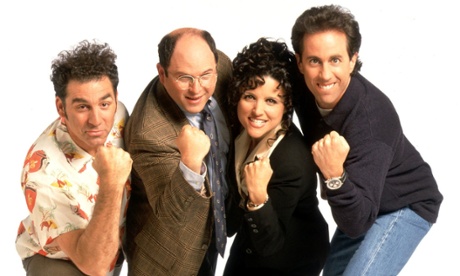
For the first time ever, Jerry Seinfeld and Larry David’s seminal New York-set sitcom has been made available to watch in its entirety on demand, with Hulu spending a hefty $180m to acquire the rights to all 180 episodes. Great news, of course, but even in these days of binge-viewing, that’s an intimidating amount of TV to plough through. Here then are the five Seinfeld episodes that you should watch before all others.
As ever, with a show with as many great episodes as Seinfeld, there always going to be favourites missing (no Soup Nazi? No Puffy Shirt?), so let us know what your definitive episodes are in the comments.
The Chinese Restaurant: season two, episode 11
Seinfeld, it must be said, is a show that takes a while to get going. Its five-episode first season feels little more than a long and very shaky pilot, and much of its second season feels similarly uncertain. It’s only with The Chinese Restaurant that the show really finds its singular, digressive tone.
Jerry, George and Elaine (Kramer is strangely absent) spend the entire episode waiting for a table at a Chinese restaurant, chatting, arguing with the maitre d’ and complaining about being hungry. Not much of a plot then, but an enormous amount of comedy is spun out of that slender concept. In that sense it’s the platonic ideal of Seinfeld’s “show about nothing” ethos, and a template for later, better seasons (they’d repeat the “bottle episode” trick in season three’s The Parking Garage).
The Pez Dispenser: season three, episode 14
In which George starts dating a pianist, and Elaine ruins the woman’s recital by laughing uncontrollably at the Tweety Pie Pez dispenser Jerry places on her knee. It’s one of those classically Seinfeld set-ups, at once incredibly specific, but also touching on something universal (who hasn’t, at some point, gotten the giggles at a highly inappropriate time?). Plus Kramer creates a cologne that smells of the beach. What’s not to love?
The Contest: season four, episode 11
Arguably the definitive Seinfeld episode, The Contest is definitely the show’s filthiest, managing to be as blue as any of the more adult cable shows that followed it. After George’s mother “catches him”, the gang hold an impromptu bet on who can last the longest without masturbating. Except, because Seinfeld is a network TV show, the word “masturbating” is never used. Instead, we get an endless barrage of euphemisms (“Are you master of your domain?”), as the quartet each struggle to stay in the game. Kramer’s departure from the contest is probably the show’s funniest moment.
The Marine Biologist: season five, episode 14
The title be damned: George Constanza is the real star of Seinfeld. By turns neurotic, self-aggrandising, self-loathing and cowardly, he was Larry David’s surrogate id – at least until David set his own id loose in Curb Your Enthusiasm a few years later. Season five features more than its fair share of vintage Costanza moments – George becoming a hand model, George buying a ludicrously oversized Gore-Tex coat, George doing the opposite of what all his instincts tell him to (because his instincts are just plain wrong) – but it’s the Marine Biologist that is arguably his finest hour. In it George, tells a woman that he’s a marine biologist and then is made to intervene when a whale becomes beached. George’s dramatic Ahab-like retelling of the story (“The sea was angry that day, my friends, like an old man trying to send soup back in a deli”) builds to a brilliant climax involving Kramer and a golf ball.
The Yada Yada, season eight, episode 19
David left Seinfeld at the end of season seven, and the show became broader, wackier, and ultimately worse in his absence. That said, there are a few notable high points in the show’s baggy final two seasons. The bizarre Merv Griffin Show, where Kramer turns his apartment into a late-night studio, and the ingenious The Betrayal, told in reverse like the Pinter play of the same name, both stand up to scrutiny. Best of all is The Yada Yada, which features a great George storyline with a strong payoff, and which popularised the phrase “yada yada”, another example of the show’s cultural clout. All that and a rare appearance from Brian Cranston’s dubious dentist Dr Tim Whatley.



.jpg?w=600)



